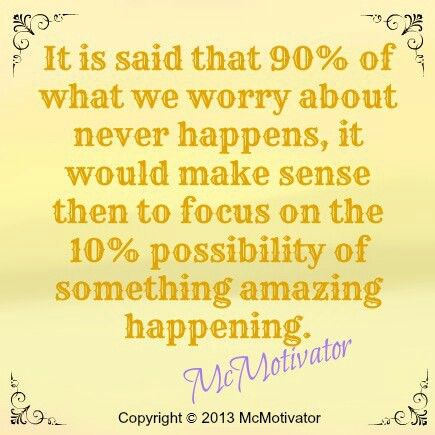This post is based on the following image:

I found this again whilst going through some saved images on my phone this week and it really struck a chord. Thinking of my own experiences, I know that my state-of-mind is in a worse place if I constantly think of the negatives in any situation. For example, If I worry ahead of chairing a work meeting with senior colleagues, I find I fear the worse and end up on tenterhooks throughout. If I’m setting up in advance of a gig and don’t particularly like something about the way I look (a common occurrence, as regular readers will know), that plays on my mind throughout the gig, spoiling a scenario which I should be enjoying every second of. If I think that any new activity I make a start on, particularly one where I’m creating something (such as writing blog posts, stories, books or songs) will be useless and doomed to fail, that negative mindset tends to stay with me and affects my desire to create, often leading to me not starting at all.
However, if I am in a frame-of-mind where I’m able to flip all of the above on its head, the difference is astonishing. Such occasions are less frequent, though there are times when I find myself with more confidence and it’s as though I’m a different person. If I approach work meetings that I chair with confidence and positive anticipation, I always do a better job of hosting. I speak with confidence and authority. I have conviction in my answers to questions. Impostor syndrome does not kick in at any point. If I approach a gig thinking I look as good as I could possibly do in that moment, and it doesn’t matter as I’m a half-decent guitarist anyway, the gig always goes well. I play with confidence and make fewer mistakes. I enjoy each moment and the feedback from the crowd. I interact well with Becci (the amazingly talented singer I’m fortunate to work with). I just have a much better gig. If I believe that I’m capable enough to try new things, especially when it comes to writing, and there may be an audience out there who might just appreciate what I create, I do stand more of a chance of starting new projects and enjoying them for what they are, rather than typing every sentence then stopping and being hyper-critical of what I’ve produced.
The concept of it being easier to spot problems when we’re constantly thinking of problems is especially true in the current climate. Yes, Covid-19 has clearly been devastating for a significant amount of people and I certainly don’t wish to appear to be brushing that aside without due recognition of just how this has affected so many of us. But, for the vast majority of us, life does go on and will return to some degree of normality in time. Most of us will get through this. It’s a well-worn cliché now but, whilst we will live in a changed world to some degree, the majority of us will be there, living and breathing in that changed world. We will survive. However, if we constantly watch TV news bulletins every day, or read newspapers daily, or scroll through current affairs posts on Facebook, Twitter and other social media feeds, we’ll always end up focusing on the negatives, without a shadow of a doubt. Countries in disarray; the prospect of entering a further recession that will take years, perhaps decades, to recover from; political lies, cover-ups, and shrewdly handing out multi-million-pound contracts to close acquaintances whilst Covid and protest groups clashing take centre-stage; schools perhaps not being able to fully open in September and the consequences of that; Z-list celebrity trolls being banned from Twitter for seemingly inciting hatred. The list goes on and, whilst many of the entries are genuine concerns, if we constantly seek out (or are force-fed) such stories, we’ll spend every hour of every day thinking we’re all doomed; thinking that there is no hope and no way out of this. That simply isn’t true. Seek out the positive news – there is still some out there, you just need to know where to look. Ditch the TV news and the newspapers. Look back in history (we’re not banned from doing so yet…) and remember that our ancestors got through troubled times and so will we. Start thinking of what you wish to do when we’re through this – how you want your life to look; what you want to prioritise; if you’re content to live life as you did previously or if there are any changes you wish to make (small or large). There is no right or wrong but simply thinking about this and trying to put a positive slant on some aspects of the current situation might just ensure that you’re not spending every hour of every day living in fear and worrying about just how you’re going to get through.
So, to wrap up, is there anything in the theory of being able to improve our mental health by considering that it’s easy to spot problems when we’re always thinking of problems? I believe this is true to a degree. If we have mental health issues of any kind, whether it’s depression, anxiety, low self-esteem, a lack of confidence, or anything else, merely thinking about this theory isn’t going to provide an instant cure. It is highly unlikely that considering this will eradicate issues which are deeply rooted and difficult to address. However, thinking of this can certainly help. As in my own examples detailed earlier in this post, it isn’t always possible to just snap into ‘positive thought mode’ and gambol joyously through the flowered meadows of life without a care in the world. However, if we can just find a few minutes of calm to reflect on what the potential positive outcomes of any situation may be, it might just help us a lot. I’d perhaps add a line to the image at the beginning of this post: Easier to get in a positive frame of mind when we hone in on what we’re capable of and what our strengths are…
I’ve included one last image at the foot of this post for you to ponder. It’s an oft quoted one and it may or may not be true, though I think it applies pretty well to my life. A huge amount of the things I’ve worried about in the past have never materialised. Some have, though much of that worry was wasted time and anxiety-inducing. Again, it’s not as simple as saying ‘don’t worry and everything will be alright’ (if only we could all think like Bob Marley…) but there is something in this. If you’re worried about something right now, to such a degree that it’s causing you to be anxious all day, or perhaps lose sleep, please do think about this. How many of your previous worries in life have materialised? How likely is this current concern likely to materialise? It might just lead to a better night’s sleep…
As always, thanks for reading and take care.
Best wishes.
Mick
